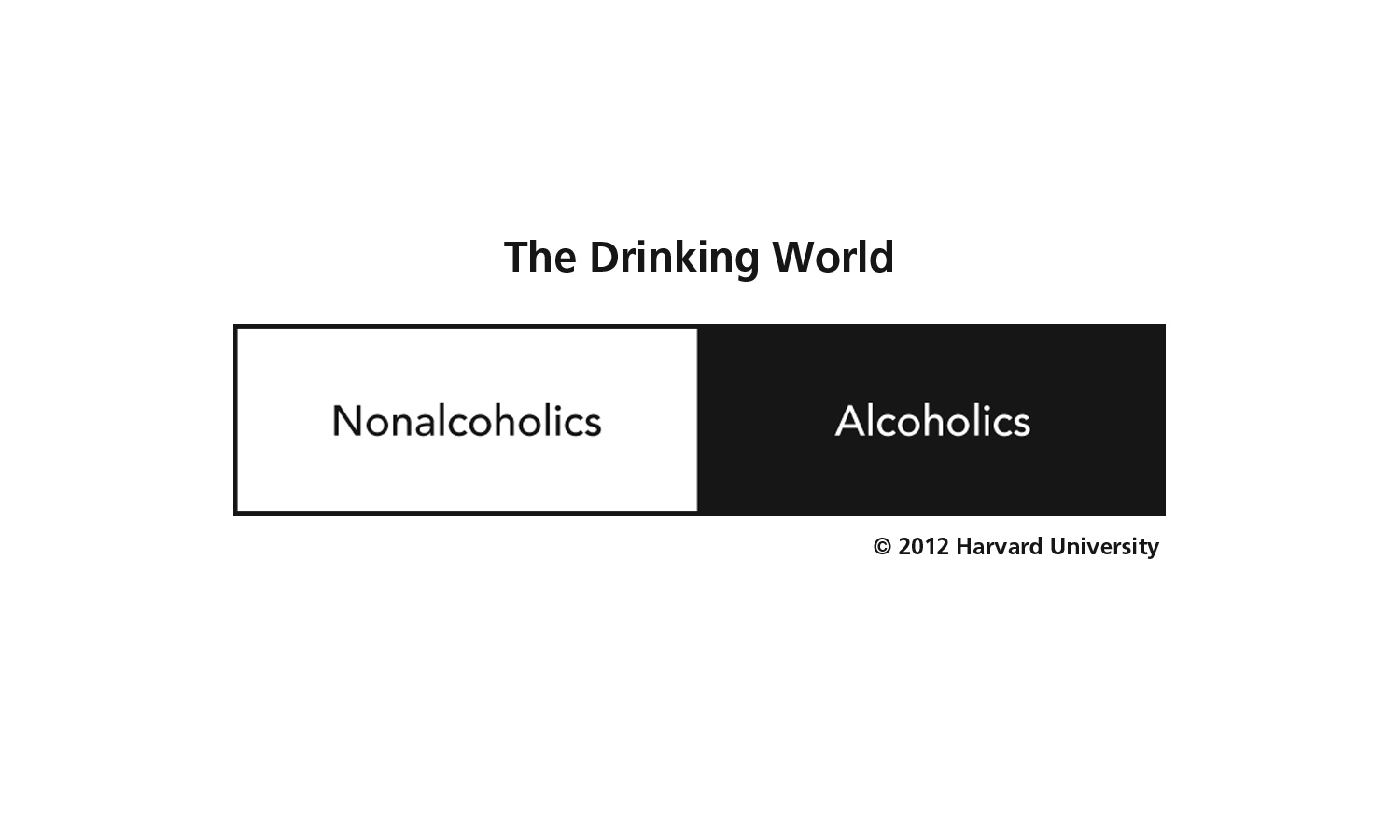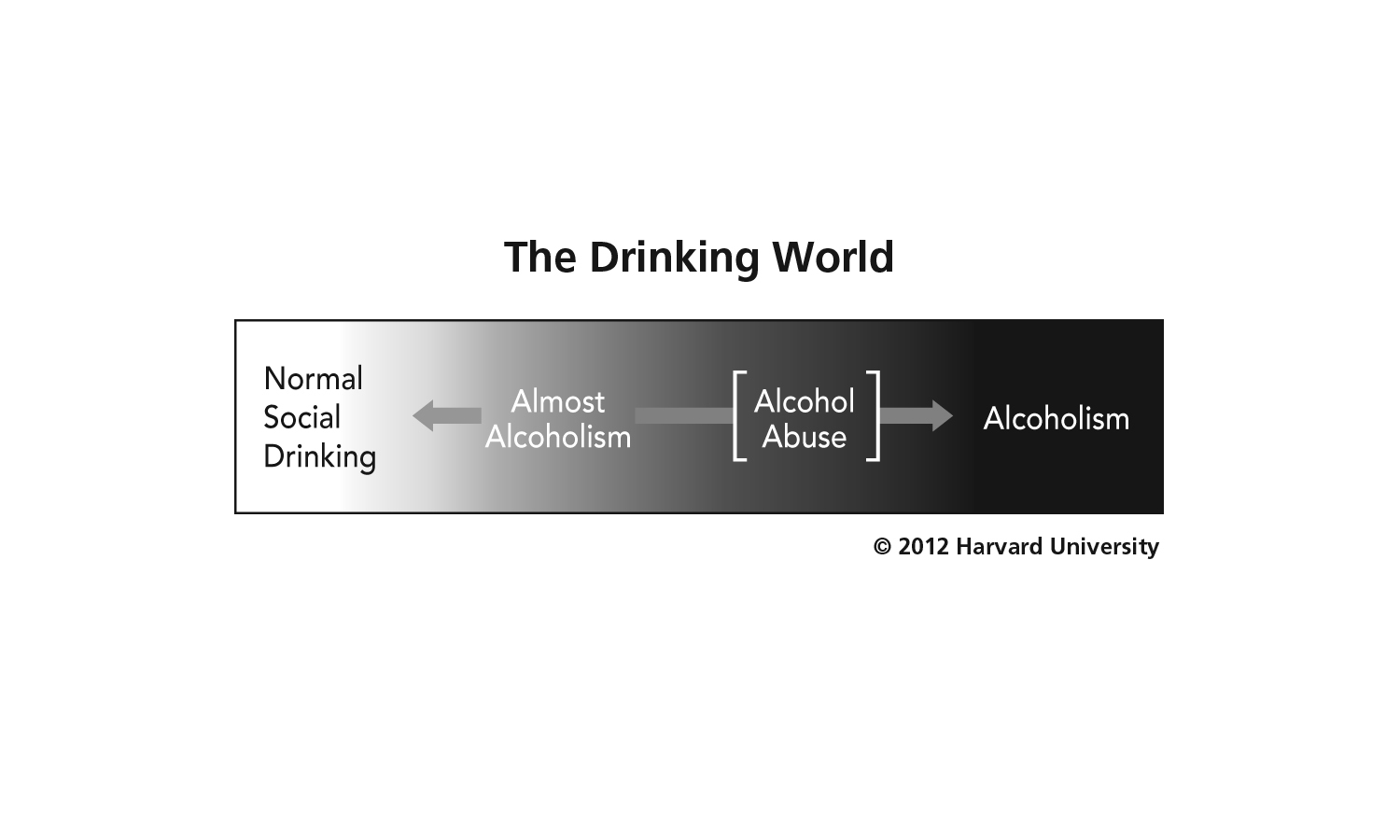
Over my 25 years of experience as a psychologist, I gradually came to realize that drinking may be one of the most common yet least talked about causes of marital conflict. Unfortunately, in the couples I've worked with this issue is often swept under the carpet. And when it does arise it usually devolves quickly into a scenario something like the following:
"You're an alcoholic."
"No, I'm not."
"Yes, you are!"
"No, I'm not!"
Needless to say, this kind of interaction leads to nothing other than perhaps anger and alienation between spouses. For some it can be tantamount to marital Armageddon. Sadly, this does not have to be dead end it so often is. The reason why this scene is so common -- and futile -- has to do in part with the way society (and health professionals) have traditionally viewed drinking problems, which is as a dichotomy, as represented by the diagram below.

Viewed from this perspective, the "drinking world" is neatly divided into two mutually exclusive categories: alcoholics, and the rest of us. But is this reality? No, it is not. In fact, while drinking does contribute mightily to marital problems, the vast majority of men and women who have what might be termed a "drinking problem" are not alcoholics. Rather, they fall somewhere in the almost alcoholic zone that is depicted in the following diagram.
From this perspective the drinking world is a spectrum as opposed to a dichotomy. And as you can see the almost alcoholic zone is fairly large, and even within that zone there are varying degrees. In other words, a person may have only recently made the move from what I call "normal social drinking" into the "almost-alcoholic" zone; alternatively, they may have been living fairly deep in this zone for years, yet still not meet the criteria for a diagnosis of alcoholism.
The greatest risk of living in the almost-alcoholic zone is that people may not "connect the dots" (or want to connect the dots) between their drinking behavior and its consequences, including its consequences on their relationships. Being an almost alcoholic can most definitely, however, have effects on our health, our emotions, and our ability to realize our potential as workers, parents, and spouses.
A New Approach
If you agree that it gets nowhere to get into a "diagnostic standoff" as described above, then here are some suggestions for addressing this issue more effectively:
Avoid the "A" and "D" Words
Calling someone an alcoholic has a nearly 100 percent chance of getting their hackles up. Despite the fact that there is less stigma associated with alcoholism today than there once was, it is still a clinical diagnosis -- and an unflattering one. Aside from that, most men and women who are experiencing drinking-related consequences fall somewhere in the almost-alcoholic zone. It's better to leave a diagnosis of alcoholism to qualified professionals and keep it out of a marital dialogue.
The same rule applies to the "D" word: denial. For years it was popular among alcoholism counselors to declare that any clients of theirs who expressed doubt that they were alcoholics were in "denial," in other words, refusing to face the truth and admit it. This kind of confrontation undoubtedly led to many people dropping out of treatment, refusing to attend even a single AA meeting, or both. A spouse who asserts that his or her partner is in denial is again likely to engender nothing more than resentment, followed by little if any change.
Don't Talk About Forever
I wish I had even a nickel for every man and woman who woke up after getting drunk and declared that he or she would never drink again! I'd be a rich man indeed. Spouses who try to get a commitment from their drinking partner never to drink again are usually asking someone to make a promise they can't keep. Again, that sets the stage for disappointment and further conflict. The fact is that only the individual can make the decision that drinking is out of control and that the pursuit of abstinence is their best option. For all those millions of men and women who are in the almost-alcoholic zone, it may be quite possible to reverse course and "shift left" on the drinking spectrum.
Connect the Dots
Rather than do any of the above, a more successful approach is simply and matter-of-factly point out the connection between your partner's drinking and its consequences. These consequences can be physical, behavioral, and/or psychological. Here are a few very common examples:
•"Have you noticed that over the past six months or so you tend to fall asleep early on the couch after having your evening drinks?"
•"You've been waking up in the middle of the night and having a hard time getting back to sleep. Have you noticed that that's been happening ever since you increased your drinking?"
•"I noticed that you've cut way back on your exercising since you started having three or four glasses of wine every night."
•"You say that you've been feeling kind of depressed and tired. That seems to have gotten worse as you've been drinking more."
•"Do you think your doctor's concerns about your blood pressure going up could be connected to the fact that your drinking has increased over the past year?"
Accept "Progress Over Perfection"
Even for true alcoholics who come to the conclusion that drinking has made their lives unmanageable and that they must give it up, change is typically hard. AA has long recognized this, and while it celebrates the individual who has years of unbroken sobriety it also celebrates the individual who has days or weeks of sobriety. Again, spouses need to avoid seeking promises that are unlikely to be kept. Better to say something positive to the spouse who has had several drinks a day for years, but who for the past month has had more sober days than drinking days, and who drinks less on those days when he or she does drink.
Meeting Halfway
The above approach is much more likely to create a bond between spouses than a confrontational approach or one that seeks perfection over progress. It represents a collaborative effort that can lead to very positive change, especially for all those men and women who occupy the almost-alcoholic zone.
For more by Joseph Nowinski, Ph.D., click here.
For more on addiction and recovery, click here.
